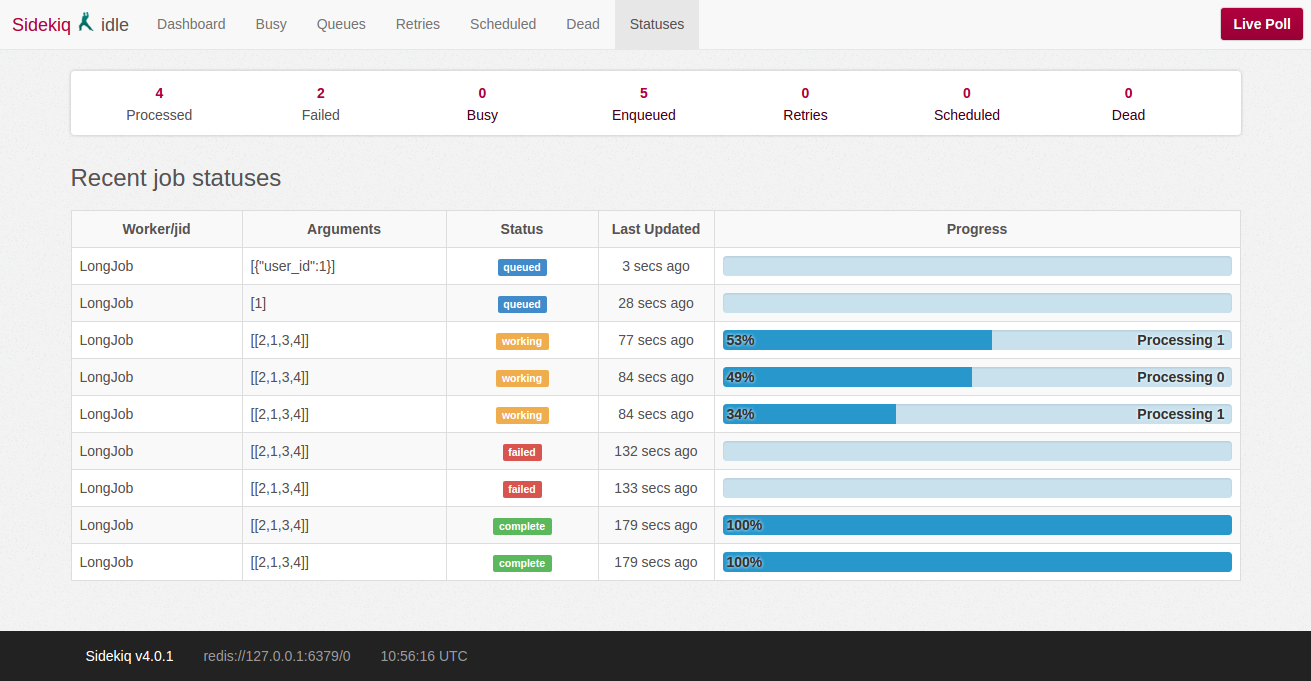Sidekiq::Status
An extension to Sidekiq message processing to track your jobs. Inspired by resque-status and mostly copying its features, using Sidekiq's middleware.
Installation
gem install sidekiq-status
Usage
Configuration
Configure your middleware chains, lookup Middleware usage on Sidekiq wiki for more info.
require 'sidekiq'
require 'sidekiq-status'
Sidekiq.configure_client do |config|
config.client_middleware do |chain|
# accepts :expiration (optional)
chain.add Sidekiq::Status::ClientMiddleware, expiration: 30.minutes # default
end
end
Sidekiq.configure_server do |config|
config.server_middleware do |chain|
# accepts :expiration (optional)
chain.add Sidekiq::Status::ServerMiddleware, expiration: 30.minutes # default
end
config.client_middleware do |chain|
# accepts :expiration (optional)
chain.add Sidekiq::Status::ClientMiddleware, expiration: 30.minutes # default
end
end
After that you can use your jobs as usual and only include Sidekiq::Status::Worker module if you want additional functionality of tracking progress and passing any data from job to client.
class MyJob
include Sidekiq::Worker
def perform(*args)
# your code goes here
end
end
To overwrite expiration on worker basis and don't use global expiration for all workers write a expiration method like this below:
class MyJob
include Sidekiq::Worker
def expiration
@expiration ||= 60*60*24*30 # 30 days
end
def perform(*args)
# your code goes here
end
end
But keep in mind that such thing will store details of job as long as expiration is set, so it may charm your Redis storage/memory consumption. Because Redis stores all data in RAM.
What is expiration time ?
As you noticed you can set expiration time for jobs globally by expiration option while adding middleware or writing a expiration method on each worker this expiration time is nothing but
- Redis expire time, also know as TTL(time to live)
- After expiration time all the info like status, update_time etc. about the worker disappears.
- It is advised to set this expiration time greater than time required for completion of the job.
- Default expiration time is 30 minutes.
Retrieving status
Query for job status any time later:
job_id = MyJob.perform_async(*args)
# :queued, :working, :complete, :failed or :interrupted, nil after expiry (30 minutes)
status = Sidekiq::Status::status(job_id)
Sidekiq::Status::queued? job_id
Sidekiq::Status::working? job_id
Sidekiq::Status::complete? job_id
Sidekiq::Status::failed? job_id
Sidekiq::Status::interrupted? job_id
Important: If you try any of the above status method after the expiration time, will result into nil or false
Tracking progress, saving, and retrieving data associated with job
class MyJob
include Sidekiq::Worker
include Sidekiq::Status::Worker # Important!
def perform(*args)
# your code goes here
# the common idiom to track progress of your task
total 100 # by default
at 5, "Almost done"
# a way to associate data with your job
store vino: 'veritas'
# a way of retrieving said data
# remember that retrieved data is always is String|nil
vino = retrieve :vino
end
end
job_id = MyJob.perform_async(*args)
data = Sidekiq::Status::get_all job_id
data # => {status: 'complete', update_time: 1360006573, vino: 'veritas'}
Sidekiq::Status::get job_id, :vino #=> 'veritas'
Sidekiq::Status::at job_id #=> 5
Sidekiq::Status::total job_id #=> 100
Sidekiq::Status:: job_id #=> "Almost done"
Sidekiq::Status::pct_complete job_id #=> 5
Unscheduling
scheduled_job_id = MyJob.perform_in 3600
Sidekiq::Status.cancel scheduled_job_id #=> true
# doesn't cancel running jobs, this is more like unscheduling, therefore an alias:
Sidekiq::Status.unschedule scheduled_job_id #=> true
# returns false if invalid or wrong scheduled_job_id is provided
Sidekiq::Status.unschedule some_other_unschedule_job_id #=> false
Sidekiq::Status.unschedule nil #=> false
Sidekiq::Status.unschedule '' #=> false
# Note: cancel and unschedule are alias methods.
Important: If you try any of the status method after the expiration time for scheduled jobs, will result into nil or false. But job will be in sidekiq's scheduled queue and will execute normally, once job is started on scheduled time you will get status info for job till expiration time defined on Sidekiq::Status::ServerMiddleware.
Sidekiq web integration
Sidekiq::Status also provides an extension to Sidekiq web interface with a /statuses.

Setup Sidekiq web interface according to Sidekiq documentation and add the Sidekiq::Status::Web require:
require 'sidekiq/web'
require 'sidekiq-status/web'
Testing
Drawing analogy from sidekiq testing by inlining,
sidekiq-status allows to bypass redis and return a stubbed :complete status.
Since inlining your sidekiq worker will run it in-process, any exception it throws will make your test fail.
It will also run synchronously, so by the time you get to query the job status, the job will have been completed
successfully.
In other words, you'll get the :complete status only if the job didn't fail.
Inlining example:
You can run Sidekiq workers inline in your tests by requiring the sidekiq/testing/inline file in your {test,spec}_helper.rb:
require 'sidekiq/testing/inline'
To use sidekiq-status inlining, require it too in your {test,spec}_helper.rb:
require 'sidekiq-status/testing/inline'
Features coming
- Stopping jobs by id
Thanks
- Pramod Shinde
- Clay Allsopp
- Andrew Korzhuev
- Jon Moses
- Wayne Hoover
- Dylan Robinson
- Dmitry Novotochinov
- Mohammed Elalj
- Ben Sharpe
License
MIT License , see LICENSE for more details. © 2012 - 2015 Evgeniy Tsvigun


